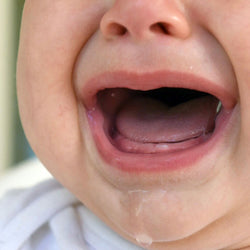GERD in Babies: Infant Reflux Symptoms, Causes, and Treatments

by Jess Wartinger
Sep 22, 2018
Every new parent dreams of the idyllic newborn who sleeps long stretches, easily awakes to take full feedings, and contentedly burps following them. While new parents may find the early days a bit different than their expectations, they’ll gradually fall into predictable patterns with baby.
For some parents, however, the first few days are smooth sailing only to hit what seems like a roadblock a week or two (or three) after their baby is born. All of a sudden their baby is spitting up after every feeding, is inconsolable much of the day, and isn’t napping or sleeping more then a short stretch.
These are common signs of infant reflux. If this sounds like your baby, take a look at what causes infant reflux, additional symptoms to look for, and potential treatments for you little one. You’ll also want to chat with your pediatrician; infant reflux necessitates a doctor’s visit.
What is Infant Reflux?
Unfortunately some babies, almost 5% of them, will experience infant reflux. Infant reflux is characterized by an immature sphincter valve which allows food (mixed with stomach acid) back up into the esophagus. This can cause excessive spitting up and can be painful.
Article Continues Below Advertisement
For many babies spitting up doesn’t affect their day-to-day demeanor. They continue to be happy, healthy, and gain weight appropriately. The spitting may peak around month four and then these little ones gradually outgrow their reflux.
Infants with reflux or GERD, however, are different. GERD (which stands for Gastroesophageal Reflux Disease) is a more severe form of relux that may initially mimic the symptoms of colic. Therefore, it can take a while to diagnose.
GERD is a serious medical condition which requires medical intervention to treat. It can cause intense pain which eventually leads to a food aversion in babies. This will affect weight gain, sleeping patterns, and can contribute to stress in the home.
Symptoms of GERD
Infants can be initially diagnosed with colic, only to have increasing symptoms before being diagnosed with GERD.
Article Continues Below Advertisement
Common symptoms of GERD in infants can include:
- Excessive spitting up
- Aversion to food and refusing feedings
- Coughing or choking after feedings
- Inconsolable crying
- Trouble gaining weight or weight loss
- Disturbed naps and nighttime sleep
If your notice that your newborn has a majority of these symptoms, you’ll want to discuss your concerns with your pediatrician.
Treatments for GERD
For babies with mild reflux, simple changes at home may be enough to ease his symptoms. Chat with your pediatrician about modifying your routines slightly in order to ease mild reflux symptoms.
Modifications may include:
Article Continues Below Advertisement
- Giving more frequent (but shorter) feedings to preventing your baby from becoming too full
- Slightly thickening formula or breastmilk with rice cereal
- Keeping baby upright for about 30 minutes after a feeding
Infants with GERD will require medical intervention to ease their symptoms. These interventions commonly include medications designed to reduce stomach acid. In the most extreme cases, surgery may be necessary to tighten the lower esophageal sphincter.
While GERD doesn’t affect the majority of babies with reflux, its symptoms are important to note. If your baby appears to be in pain, is unable to be easily consoled, and is having an aversion to feedings it’s time to chat with your pediatrician.
***Disclosure: This post provides content and discussion related to health, wellness, and related subjects. The words and other content provided in this blog including links should not be considered medical advice and should not be construed as such. Any health/wellness information should not be considered an alternative or replacement for information given to you by a licensed physician. If the reader or any other person has a medical concern, he or she should consult with a licensed physician.
Jess Wartinger
Jess Wartinger resides in rural New York with her husband and five children. Formerly an early elementary teacher, Jess currently spends her time loving her kids and holding down the fort at home.






